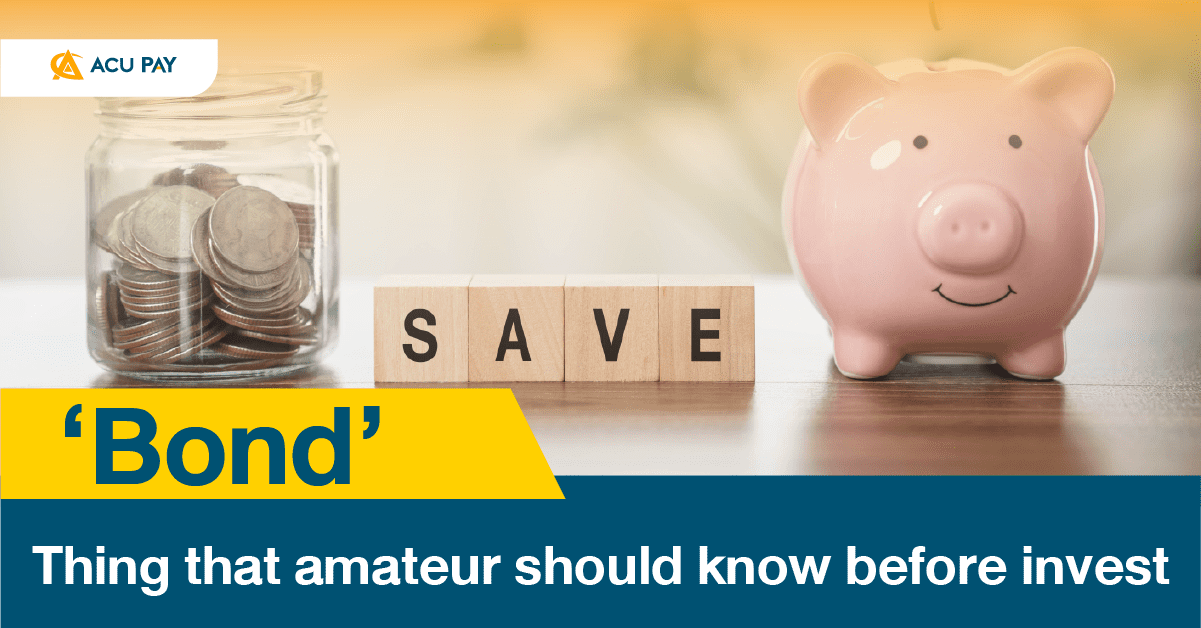

Although investments in debt instruments are less risky than stocks and have a chance of getting consistent returns, there are still important factors to consider when investing. ACU PAY will introduce debt instruments in short and investment precautions for beginners who are interested in debt instruments investment.
The debt instrument or ‘Bond’ is a financial instrument in which holders (investors) are creditors and issuers are debtors. Creditors will receive returns in the form of “interest” consistently over a specified period and will receive “principal” back when the time is due.
The key point is that bonds are low-risk investments with a stable yield of 2-5% on average, which is 0.3 – 0.5%, higher than conventional deposit rates. In addition, Bonds also have lower volatility than other investments which helps in spreading risk well.
1. Bonds issued by the government or government agencies
Government bonds issued by government agencies which are government ministries or agencies, state enterprises, the Bank of Thailand, etc. For example, government bonds, savings bonds, and Bank of Thailand (BOT) bonds, state enterprise bonds, and treasury bills. The government will use the public’s money to borrow to use in economic and social development through the implementation of various government policies.
2. Bonds issued by the private
Or debentures are fixed-term debt instruments that usually pay interest in installments and repay principal at maturity. Most of them are short-term debt instruments such as 3 months, 1 year, 3 years, 10 years, or may not have maturities called Perpetual Bonds. At due, investors will receive funds back equal to the price of the ticket, thus making profits equal to the difference from the price of the ticket.
In general, private debt instruments are divided into two major groups, using credit ratings. The higher the credit rating, the lower the default risk.
Group 1: Investment Grade starting from AAA to BBB. These groups are considered debt instruments with lower risk of default and is stable.
Group 2: High Yield Bond ranges from BB to D. These are debt instruments with a higher risk of default than the first group, thus resulting in higher yields to offset this risk, but they are more likely to default, often used for speculation.
During the upward interest rate trend, investors should choose to invest in short-term fixed-income funds with a maturity of less than one year because these bonds will be less affected by price when the interest is raised. On the other hand, if interest rates fall, investment in long-term fixed-income funds over one year or longer should be appropriate for long-term investment plans to provide opportunities for bond price adjustments and future speculation.
1. The risk of interest rates fluctuating
Although bond yields have been set in advance, investors knew from the beginning how much interest they would receive. However, if interest rates went up, prices of existing bonds in the market would fall to compensate for lower interest rates than current ones. The upcoming bonds would have to offer investors with higher interest rates.
Moreover, the longer the average maturity of debt instruments weighted by the current value of cash flow from future debt instruments (Duration), the more effect received by the interest rate increases. Therefore, short-term or long-term bond investments will have to take into account interest rate trends.
2.The risk of default
ความเสี่ยงในการผิดนัดชำระหนี้ ขึ้นอยู่กับประเภทตราสารหนี้ที่ลงทุน ถ้าเป็นของบริษัทเอกชน ยิ่งมีอันดับการจัดบัตรเครดิตต่ำ ก็จะยิ่งมีความเสี่ยงในการผิดนัดชำระสูง ทำให้นักลงทุนอาจจะไม่ได้รับเงินคือ หรือได้รับไม่เต็มจำนวนความเสี่ยงนี้ถือเป็นความเสี่ยงหลักของการลงทุนในตราสารหนี้
3. The risk of liquidity
Due to the lack of liquidity of bonds in the market, debt instruments may be unable to sell them at a reasonable time or price such as prices that are lower than they should be. Unless you hold bonds until the due date, then do not worry about this risk.
Bonds are another interesting investment alternative amid volatile financial markets due to various risk factors. However, before every investment, a thorough study should be conducted in preparation for possible investment risks.